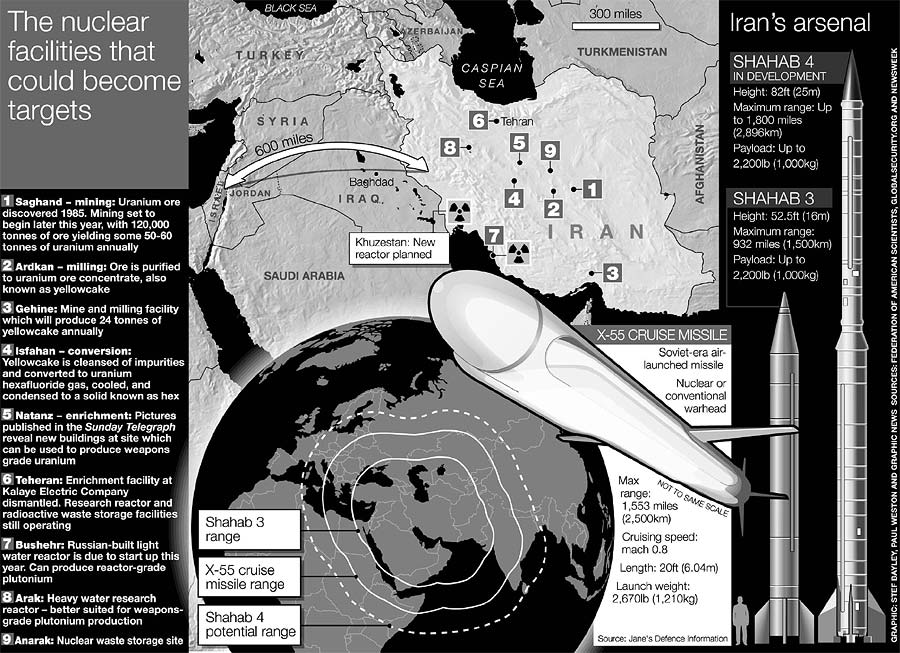
| Mid-East Realities | www.middleeast.org |
US prepares military blitz against Iran's nuclear sites
By Philip Sherwell in Washington
Central Command and Strategic Command planners are identifying targets, assessing weapon-loads and working on logistics for an operation, the Sunday Telegraph has learnt.
 | |
They are reporting to the office of Donald Rumsfeld, the defence secretary, as America updates plans for action if the diplomatic offensive fails to thwart the Islamic republic's nuclear bomb ambitions. Teheran claims that it is developing only a civilian energy programme.
"This is more than just the standard military contingency assessment," said a senior Pentagon adviser. "This has taken on much greater urgency in recent months."
The prospect of military action could put Washington at odds with Britain which fears that an attack would spark violence across the Middle East, reprisals in the West and may not cripple Teheran's nuclear programme. But the steady flow of disclosures about Iran's secret nuclear operations and the virulent anti-Israeli threats of President Mahmoud Ahmadinejad has prompted the fresh assessment of military options by Washington. The most likely strategy would involve aerial bombardment by long-distance B2 bombers, each armed with up to 40,000lb of precision weapons, including the latest bunker-busting devices. They would fly from bases in Missouri with mid-air refuelling.
The Bush administration has recently announced plans to add conventional ballistic missiles to the armoury of its nuclear Trident submarines within the next two years. If ready in time, they would also form part of the plan of attack.
Teheran has dispersed its nuclear plants, burying some deep underground, and has recently increased its air defences, but Pentagon planners believe that the raids could seriously set back Iran's nuclear programme.
 | |
Iran was last weekend reported to the United Nations Security Council by the International Atomic Energy Agency for its banned nuclear activities. Teheran reacted by announcing that it would resume full-scale uranium enrichment - producing material that could arm nuclear devices.
The White House says that it wants a diplomatic solution to the stand-off, but President George W Bush has refused to rule out military action and reaffirmed last weekend that Iran's nuclear ambitions "will not be tolerated".
Sen John McCain, the Republican front-runner to succeed Mr Bush in 2008, has advocated military strikes as a last resort. He said recently: "There is only only one thing worse than the United States exercising a military option and that is a nuclear-armed Iran."
Senator Joe Lieberman, a Democrat, has made the same case and Mr Bush is expected to be faced by the decision within two years.
By then, Iran will be close to acquiring the knowledge to make an atomic bomb, although the construction will take longer. The President will not want to be seen as leaving the White House having allowed Iran's ayatollahs to go atomic.
In Teheran yesterday, crowds celebrating the anniversary of the 1979 Islamic revolution chanted "Nuclear technology is our inalienable right" and cheered Mr Ahmadinejad when he said that Iran may reconsider membership of the nuclear Non-Proliferation Treaty.
He was defiant over possible economic sanctions.

| Mid-East Realities | www.middleeast.org |
| Source: http://www.middleeast.org/articles/2006/2/1344.htm |